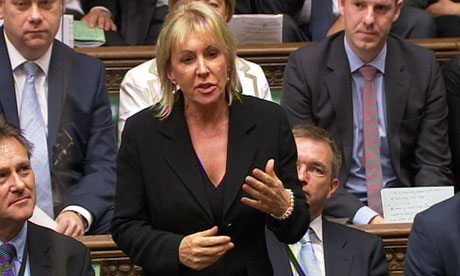
Listening to the Conservative MP Nadine Dorries talk about her thinning hair on national television brought it all back: the repeated visits to my GP's surgery in my 30s to discuss my fears about my hair loss, my tears and protestations, the doctors' blank stares or well-meaning smiles and their not-so-subtle hints that the problem was, most likely, in my head rather than on top of it.
Hearing Dorries also reminded me of the hours I spent trawling the internet for answers, searching the shelves of health food stores for supplements and sitting in the consulting rooms of kiniesiologists, naturopaths, homeopaths and, finally, one of London's top trichology clinics – leaving feeling several hundred pounds lighter than when I walked in.
The conflicting messages I got as I researched my condition were enough to make me want to pull my hair out – if I hadn't been so worried about losing it already. Just as frustrating, at times, were the reassurances from friends and some professionals that they couldn't see anything wrong with my hair. Eventually, I got a satisfactory answer when a trichologist diagnosed me with androgenetic alopecia, also known as female pattern baldness – a genetic condition that can be arrested but not cured – but I believe there were other contributing factors ranging from high stress to low iron levels.
The fact is hair loss is incredibly complex. According to the Institute of Trichologists, there are 50 different types of hair loss and 300,000 pills and potions on sale in the northern hemisphere – only a handful of which have proven effective in clinical trials.
In men, losing hair is more accepted, although it comes with its obvious challenges. In women, however, it's still a taboo, despite efforts by Gail Porter and now by Dorries to raise awareness. But while some hair loss is sudden and dramatic, other types are more gradual, less noticeable to others but just as damaging to a woman's self-esteem.
So I commend Dorries for sharing her hair travails on national television and I agree that there are many women out there who are suffering in silence.
Unfortunately, though, for every woman like Dorries who can afford to walk into a hair clinic and get treatment (as I could back when I was working in a high-stress job that no doubt contributed to my thinning hair), there are hundreds if not thousands more who are sitting in GPs' surgeries in tears, being told there's nothing wrong with their hair, or who are spending hundreds of pounds on lotions and potions.
And while we all appreciate that the NHS has limited resources and must prioritise life-threatening conditions or more serious illnesses, women who are struggling with what Dorries called the "confidence stealing" condition of hair loss deserve to be heard and offered some form of help, rather than dismissed. Hair loss leads to stress, anxiety and depression, which come with their own healthcare costs.
Dorries's TV appearance also reminded me, however, that we need to work harder to deconstruct the one-size-fits-all image of female beauty propagated by the media and the beauty industry that so many women, particularly young girls, feel they have to live up to. Shampoo adverts featuring celebrities with glossy manes (often enhanced with hair extensions) can prey on girls' low self-esteem and poor self-image, even if their hair isn't thinning.
I remember my own teenage years – feeling lost and lonely as I gathered up clumps of hair from my pink bedroom carpet after an eating disorder and hormonal imbalances triggered hair shedding. My shiny, wavy hair turned into fluffy, fine curls and I no longer felt good enough.
So let's keep speaking out about female hair loss and breaking the taboos – as Dorries has done – but let's get better training about the condition for NHS doctors, raise awareness about the links between hair loss, anxiety and depression and get a more balanced view of feminine beauty into the media and on to our TV screens.

